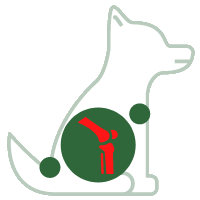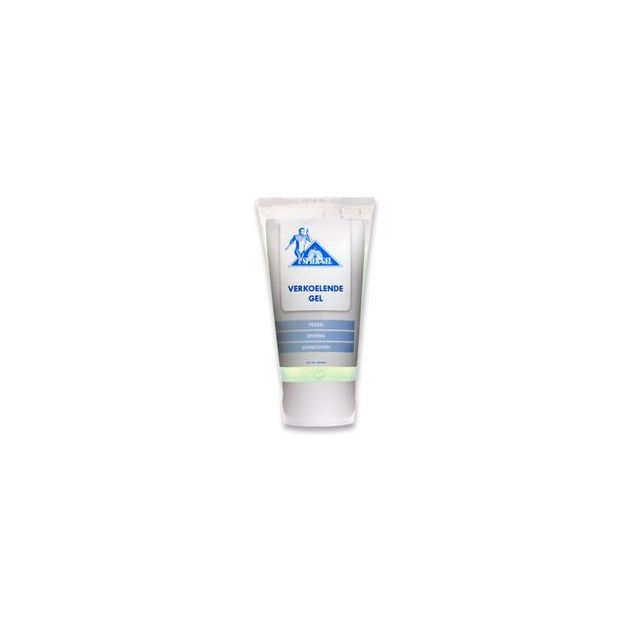The joints of the dog
Happy dogs want to run, play, walk, and jump. When they start to experience joint issues, this can - besides causing a lot of pain - reduce the quality of life for your dog. Fortunately, you can do a lot yourself to keep your dog's joints as flexible as possible. Pharmacy4pets assists you and your dog with various dietary supplements and advice for an active life.
Joint Problems in Dogs
Joints are the hinges between two bone parts and are spread throughout the skeleton, from the toes to the neck. They provide mobility and are supposed to help absorb shocks. Various problems can arise in a dog's joints. The most common ones will be briefly discussed.
Arthritis in Dogs
In arthritis, damage occurs to the cartilage in the joint, accompanied by inflammation. Arthritis is particularly common in older dogs of large breeds but can occur in any dog. Dietary supplements such as Flexadin Advanced and Iso-Joint +Acute support the joints. Additionally, special dietary food such as Sanimed Osteoarthritis helps to keep your dog's joints flexible.
Hip Dysplasia
We often see hip dysplasia or HD in dogs of large breeds. This is when the connection of the head of the femur in the hip socket is not correct. Many factors play a role in the development of hip dysplasia, including heredity. If you are considering purchasing a puppy from a breed where HD is common, be well informed and ensure that both parents have been screened for HD. Dogs with HD have a greatly increased risk of arthritis later in life.
Patellar Luxation
In patellar luxation, the kneecap (patella) is too loose. Patellar luxation is common in the smallest dog breeds. The constant movement of the kneecap stretches the knee ligaments and leads to arthritis. In many cases, surgery is the solution.
How to Recognize Joint Problems in Your Dog
Dogs with joint pain rarely express it by whining or crying. The symptoms are often much more subtle. Signs of joint problems in your dog can include:
- Stiffness after activity or rest.
- Difficulty standing up or getting moving.
- Limping.
- Abnormal gait: for example, bunny hopping or frequently lifting a hind leg.
- Being less active.
- Walking slower during walks.
- Expressing pain when standing up or walking.
- Behavioral changes: being more irritable, less willing to go along, less desire for affection.
- Swollen, painful joints (to the touch).
- Difficulty stretching and/or bending the joints.
- Licking and biting at the joints, sometimes resulting in a hotspot.
Do you think your dog is experiencing joint problems? Then visit the veterinarian for a thorough physical examination.
Preventing Joint Problems
There are many factors involved in the development of joint problems. You, as an owner, have influence over some of them, and thus, you can do your best to help keep your dog's joints healthy.
Preventing Overweight
It goes without saying that if a dog is overweight, its joints are excessively stressed. We therefore see relatively many cases of arthritis in overweight dogs. Arthritis causes pain, making a dog less inclined to move, which in turn presents an even greater challenge to keeping it at a healthy weight. Prevention is better than cure, so adhere to the guidelines on the packaging of the food, don't give too many snacks or table scraps, ensure your dog gets enough exercise, and make sure it stays at a healthy weight: the ribs should be easily felt with the flat of your hand and the waistline should be tucked in. If your dog is overweight, special dietary food like Sanimed Weight Reduction can help it achieve its ideal weight. If your dog is already at a good weight but tends to gain weight or has lost weight nicely with the help of a dietary food, then Sanimed Weight Control is suitable to help maintain its weight.
Exercise
Staying active is necessary to help keep joints supple. However, overexertion can increase the risk of joint problems. The exact amount and type of exercise vary greatly from dog to dog and depend on factors such as body structure (compare a Bulldog with an athletically built hunting dog), temperament, breed characteristics (for example, a Border Collie has very different needs and characteristics than a robust Cane Corso), health status, and age. Especially with puppies, the amount of exercise needs to be adjusted, and vigorous activities such as frisbee and excessive stair climbing should be avoided. However, one thing is certain: no or very little exercise is good for no dog!
Nutrition and Dietary Supplements
The foundation of health lies in nutrition. And when it comes to joints, this is especially true! Puppies need a very balanced ratio of calcium and phosphorus for proper skeletal development. Giving good puppy food for long enough is therefore essential. Sanimed Puppy contains all the nutrients for healthy and gradual growth of your puppy. It is very important with puppies to prevent too rapid growth. This starts with choosing a balanced diet, but also means not overfeeding your puppy. You can track your puppy's growth with a special puppy growth chart: the Puppy Growth Chart from the WALTHAM Petcare Science Institute.
Specific nutrients such as omega-3 fatty acids from fish oil and glucosamine and chondroitin help keep your dog's joints supple. Doils Joint is an example of a supplement with fish oil. Also, Trovet Mobility and Flexadin can support your dog's joints. There are different dogs that can benefit from these supplements, namely:
- Dogs of large breeds.
- Very active dogs (for example, agility, hunting, police sports).
- Dogs that have had a trauma or surgery to the bones or joints.
- Overweight dogs.
- Dogs with existing joint conditions such as hip or elbow dysplasia (even if there are no symptoms yet).
- Dogs with joint conditions in the family.
- Dogs that are getting a bit stiffer.
Of course, a visit to the veterinarian for clinical complaints such as lameness or stiffness is always recommended. Supplements mainly help keep the joints healthy and supple; other measures are often needed for existing problems, such as painkillers or anti-inflammatory drugs, physiotherapy, or even surgery.
If you have any questions about our products or about arthritis in your dog, please contact us.


